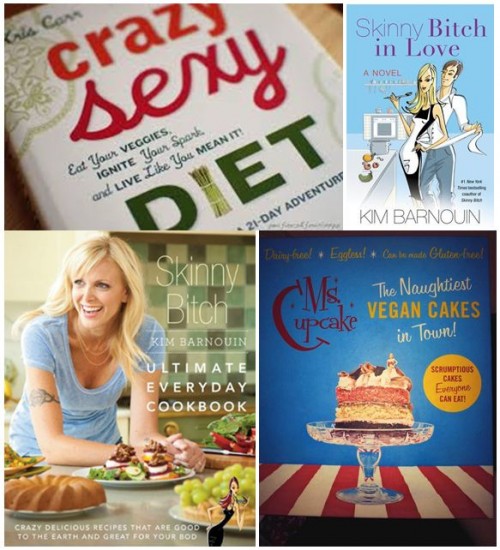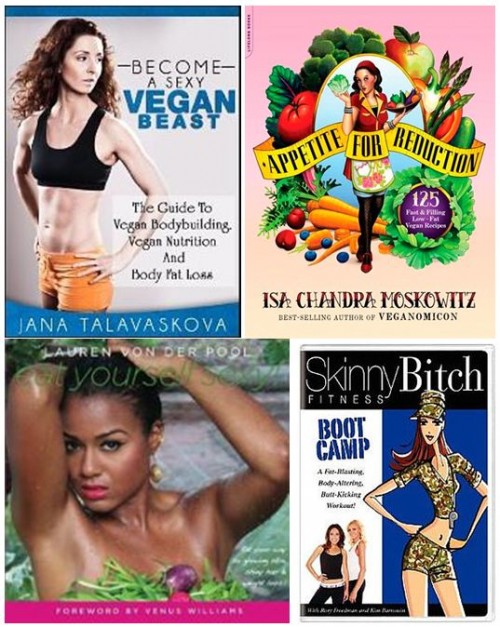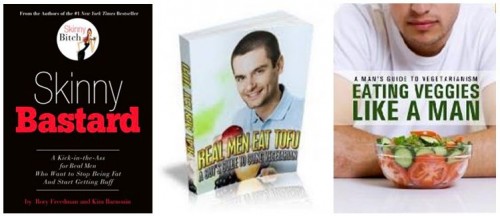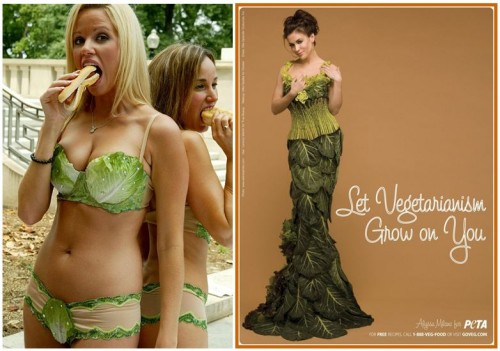 Carol Adams has written extensively on the sexual politics of meat, arguing that women and other animals are both sexualized and commodified to facilitate their consumption (both figuratively and literally) by those in power. One result has been the feminization of veganism and vegetarianism. This has the effect of delegitimizing, devaluing, and defanging veganism as a social movement.
Carol Adams has written extensively on the sexual politics of meat, arguing that women and other animals are both sexualized and commodified to facilitate their consumption (both figuratively and literally) by those in power. One result has been the feminization of veganism and vegetarianism. This has the effect of delegitimizing, devaluing, and defanging veganism as a social movement.
This process works within the vegan movement as well, with an open embracing of veganism as inherently feminized and sexualized. This works to undermine a movement (that is comprised mostly of women) and repackage it for a patriarchal society. Instead of strong, political collective of women, we have yet another demographic of sexually available individual women who exist for male consumption.
Take a browse through vegan cookbooks on Amazon, for instance, and the theme of “sexy veganism” that emerges is unmistakable:
Oftentimes, veganism is presented as a means of achieving idealized body types. These books are mostly geared to a female audience, as society values women primarily as sexual resources for men and women have internalized these gender norms. Many of these books bank on the power of thin privilege, sizism, and stereotypes about female competition for male attention to shame women into purchasing.
To reach a male audience, authors have to draw on a notion of “authentic masculinity” to make a highly feminized concept palatable to a patriarchal society where all that is feminine is scorned. Some have referred to this trend as “heganism.” The idea is to protect male superiority by unnecessarily gendering veganism into veganism for girls and veganism for boys. For the boys, we have to appeal to “real” manhood.
Meat Is For Pussies (A How-to Guide for Dudes Who Want to Get Fit, Kick Ass and Take Names) appears to be out of print, but there are others:
Then there is the popular tactic of turning women into consumable objects in the exact same way that meat industries do. Animal rights groups recruit “lettuce ladies” or “cabbage chicks” dressed as vegetables to interact with the public. PETA routinely has nude women pose in and among vegetables to convey the idea that women are sexy food. Vegan pinup sites and strip joints also feed into this notion. Essentially, it is the co-optation and erosion of a women’s movement. Instead of empowering women on behalf of animals, these approaches disempower women on behalf of men.
In sum, vegan feminism argues that women and non-human animals are commodified and sexualized objects offered up for the pleasurable consumption of those in power. In this way, both women and other animals are oppressed under capitalist patriarchy. When the vegan movement sexualizes and feminizes vegan food, or replicates the woman-as-food trope, it fails to acknowledge this important connection and ultimately serves to repackage potentially threatening feminist collective action in a way that is palatable to patriarchy.
Corey Lee Wrenn is a Council Member for the American Sociological Association’s Animals & Society section. This section facilitates improved sociological inquiry into issues concerning nonhuman animals and is currently seeking members. Membership is $5-$10; you must be a member of the ASA to join.
Cross-posted at the Vegan Feminist Network and Pacific Standard.





Comments 97
Meghan — May 8, 2014
I'm surprised to hear you say veganism is made up of mostly women. That is not my experience anecdotally. I'd love to see that statistic.
I agree about the problems with PETA's use of the male gaze as an activism tool but would point you to vegan resources like the Thrive Diet and VeganBodybuilder. I think if you looked at ANY set of cookbooks they would be catered mostly to women, not just vegan cookbooks.
zeep — May 8, 2014
"Vegan feminism"? The idea that women should be on some kind of restrictive and meagre diet seems pretty firmly part of the patriarchy to me.
The bitter irony anyway is that eating a diet of pure carbs leaves you anything but skinny.
courtney — May 8, 2014
"This works to undermine a movement (that is comprised mostly of women) and repackage it for a patriarchal society."
I would also like to see some evidence supporting this claim.
You can certainly find instances of feminization of veganism, and the sexy vegan business is just about as frustrating as the sexy yoga business - the benefits are for everyone. But there has also been increasing attention paid to veganism as a high-performance diet for athletes rather than weight loss, which is encouraging.
I wouldn't classify Isa Chandra's first few cookbooks - Veganomicon and Vegan with a Vengeance - as conforming to female gender norms. Her Post Punk Kitchen is pretty radical. She does, however, mention from time to time her lifelong struggles with weight as a diagnosed health issue, as well as the ability to make vegan food just as fat-laden as omnivorous varieties. So, I would grant her an exemption from this list.
Anna — May 8, 2014
"This has the effect of delegitimizing, devaluing, and defanging veganism as a social movement."
If this is true, that's fantastic news! The means justify the ends sometimes after all. The sooner this misguided, extremist social movement cannibalizes itself, the better truthful and balanced views towards animal product consumption can be heard.
John Donne — May 8, 2014
Just as a personal aside, I am a man and have been vegan for just over a decade. My wife became a vegetarian and then a vegan after we met. But whenever people find out that we are vegans, it is always assumed that I became vegan because of my wife.
Jeff — May 8, 2014
One corollary to the feminization of veganism is the association of sports with meat consumption -- baseball viewing revolves around hot dogs, football is about wings, etc. At Nationals Park I could never count on more of a meal than french fries. But capitalism cuts both ways on this -- when I moved to Seattle I found to my delight that the Mariners' stadium sells local Field Roast veggie sausages alongside regular hot dogs and brats. My veggie dinner there was delicious, but more than that I appreciated the recognition of vegetarians' existence at baseball games, and giving us a chance to be part of a classic American sports experience just like the meat-eating fans. If that came about due to the vendors wanting more profit and targeting an underserved consumer niche, well, I'm fine with that.
Damien Quinn — May 8, 2014
In this context, the use of "the patriarchy" to describe the problematic structure borders on the offensive. It's some sort of masculine gendered euphemism for an advertising industry hell bent on making a commodity out of the entire sphere of human existence. It's an advertising industry built on instilling a sense of inadequacy in the largest possible proportion of the population, and if ever there was a gender neutral issue, it's advertising induced feeling of inadequacy.
The images of scantly clad women in these images isn't supposed to attract men, they're supposed to make women feel bad about their bodies while offering the promise that the promoted book/diet/face-cream/tampon will make them better if they'll only buy, buy, BUY. The marketing to men aims to convince me I can attain/retain "real man" status, which is the the same rubbish in a cruder package, yet the author spins this insult to male intelligence as a patriarchal attack. a hint of confirmation bias in there, I think.
Blaming every issue that affects a broad swathe of the female population on the patriarchy might be comforting enough but it's incredibly counterproductive if you want to actually address some of the problems.
I wonder if it's even worth pointing out just how shit advertising was at manipulating people into buying shit they didn't need while it was still a male dominated industry.
Erika — May 8, 2014
I've been began for 14 years and counting; I went vegan as a direct result of my feminism. While I agree with a lot that has been written in this post, I take exception to grouping Isa Chandra Moskowitz's "Appetite for Reduction" in with books like "Skinny Bitch." Moskowitz has published multiple vegan cook books, of which only this one can be considered a so-called 'diet' book. Even this book argues a strong case for health at any size- more than anything, it's a book about eating well (and compassionately!) rather than looking 'hot.' Moskowitz herself is an awesome, unapologetic plus-size woman who definitely does not conform to PETA's beauty ideals. I agree the title is a bit misleading, but how are you gonna deny a gal her GnR reference? I think this might be a case where you shouldn't judge a book by its cover- literally.
Cade DeBois — May 8, 2014
Man I do get tired of the "Go veg, get skinny and hot" claptrap. But on the flipside, I'm also tired of this BS too> "vegan feminism argues that women and non-human animals are commodified and sexualized objects offered up for the pleasurable consumption of those in power". Becuase there never existed a society that wasn't patriarchial and capitalist that also relied of animals for food? Right now there is a huge indigenous//decolonialization movement going on, and many of these people are looking back to their traditional cultures before Western patriarchy and capitalism to find new paths of self-sufficiency. A lot of them have deep traditions of food that include animals and are looking to draw from them. And I say, more power to them. The world need diverse answers to meet the challenges of climate change and feeding billions and their traditions come from practices that required being in harmony with nature and minializing waste so to sustain and protect their food sources. These were the very traditions that capitalism tired to kill and dismiss as impractical for the modern world and were replaced by the practices that are creating our modern food production timebomb. Meanwhile, vegan feminists' pop ideology have no deep anchors in self-sustaining pre-captialist cultures like the indigenous movement does, so no wonder they have no compass to show them when they've fallen off their own self-righteous path. Good luck with all that.
Glenn — May 8, 2014
As a member of the male species, I never looked at veganism or vegetarianism as sexual especially not focusing in the women. The only thing that would bring my thoughts anywhere near this is the fact that most vegan women are not FAT like a majority of women in the USA. FAT is NOT sexy. Most women are beautiful when thin. Veganism produces this. I disagree with this article.
Amanda — May 8, 2014
Here's the masculinity side of things...women get skinny, men get meat: http://masculinities101.com/2013/12/20/meat-and-masculinity/
I once heard someone argue, in what I think it an over-stretch of Adams' argument, that women and animals share oppression. The argument became dangerously essentialized (along the lines of, cows have teats, women have teats, this is why they're abused). Strange, over simplified, problematic to say the least. But there are many ways in which capitalism objectifies women (and racial minorities) and animals in order to make their abuse palatable and I think this post does a good job of explaining that. Objectification seems a necessary step to treat things badly. I'm a vegan (and a woman, and an antiracist feminist). Since I've stopped eating animal products, I've found a deeper connection with animals and the environment....in some ways, I think eating them was keeping me from beeing able to un-objectify them, to love them. (I don't know if this is true for everyone, and I certainly don't think veganism is necessary for everyone...it's a privileged choice in many ways, to have access to the foods that make it a healthy choice, to have the money to purchase them, and so on.) I think there is a metaphor in there somewhere, like when bell hooks talks about "eating the other."
Bill R — May 9, 2014
From the get-go vegan fashioned itself a"movement" with an "image". This was done to create a niche market for selling books, magazines, conferences, speciality shops, restaurants, etc. The movement developed its own belief set, loosely borrowed from diet and "health" books, with selected scientific studies thrown in for good measure (truth being immaterial). This approach appealed to young women more than men, who are forever bound to the nonsensical belief that eating steaks makes them tough, and wouldn't be caught dead reading a magazine about food. When you market to young people, you ALWAYS emphasize the differences between the sexes
And that's why you get these silly ads.
Beate Grigutsch — May 9, 2014
the marketing business would not act this way if they were not very sure that the folks would like it....
they boy versus girl training starts in the nursery - and moms and pops who have not much more in life to be sure about as their gender pass it on every generation. i think we change nothing with criticizing simple marketing mechanism - we should show people how they can live a fulfilling and self-assured life without being reduced to a consument mass - divided by sex.
MDDO — May 9, 2014
This is great and I agree with most of it, but I don't think Appetite for Reduction belongs on this list. Moskowitz explicitly promotes "health at any size" both on the back cover and in the introduction and she notes that she wrote the book because of her own health issues and that
"I definitely didn't want to perpetuate all the fat-phobia in this country and the systemized berating of big girls. I don't think fat means you're lazy, and I definitely don't believe that the ridiculous beauty standards that our society has created for women are good reasons to change your diet. Your weight is not your worth!" etc.
Friday Sex Links | Sex with Timaree — May 9, 2014
[…] other side of privilege at Princeton. The sexual politics of […]
sashaberk — May 9, 2014
Sorry if I missed it, but I don't see this mentioned in either the article or the comments. In my experience there's also a right-wing influence on the Vegan "movement" (too big, too broad, crosses too many boundaries to call a movement) by what I call the "fundamentalist" straight-edge movement that defines itself as anti-choice in a twisted mis-reading of principals, going so far in extreme cases as to refuse swapping body fluids as animal products. This stain of the activist vegan/straight-edge movement was even vocal in claiming Carol Adams as their own which, at a talk of hers I attended around 1994, she absolutely refuted. I call them fundamentalist because of a reductionist approach of pairing down "negatives" toward an abstract idea of purity. In my upstate activist community of the 1990s, the recognized leadership a large, activist straight-edge community were two heteronormative couples, anti-choice, and the two men had a 'reputation' for being physically abusive but were considered beyond approach because of their 'pure dedication and commitment" to the movement. It's was really fucking hard to deal with. I've always felt this fundamentalist, machismo attached to vegan activism - visibly or invisibly - is part of what's become the patriarchal organizing practices of groups like PETA on a national scale
HEGANISM | girlfriendfilmproject — May 9, 2014
[…] HEGANISM […]
Delilah — May 9, 2014
REally interesting. I was aware of the PETA thing, but not all the others, altho. the title of "Skinny Bitches" is all over.
Whothehell Cares — May 9, 2014
I used to eat Feminists every morning for breakfast, but decided to go on a health kick and stop eating toxic things.
kh — May 10, 2014
Thank you for this article. Veganism's been repackaged in the mainstream media as a fad diet with thin, blonde, white women as the mascot.
It just goes to show how deeply ingrained sexism and racism is in our society, and how it is embraced even in movements that supposedly reject oppression.
Andrew — May 11, 2014
This has the effect of delegitimizing, devaluing, and defanging veganism as a social movement.
This kind of rhetoric undermines the practical objective of veganism for more effectively than the things being criticized here.
What's more important here - to be legitimized and valued as a social movement, or to actually reduce the demand for animal products?
nextmike — May 14, 2014
Oh give me a break. You academics (every damn one of you in this comments thread) twisting your post-modern minds about this "-ism" and twiddling your relativistic thumbs about that "-ism" would be funny if you weren't so tragically sad. To wit, the dear professor asserts that by appealing to masculinity, authors of vegan books for men are somehow "protecting male superiority" by "gendering" (is this some new hot verb at the academy?) veganism into veganism for girls and veganism for boys. Somehow this targeting and targeted messaging to a specific gender is "otherizing" (there we go again with this silly academia speak) and thus, by its very definition sexist. Quite frankly, it's an insipid argument that could only be heard and taken seriously in the echo chambers of the university or a site like this.
Most men and women enjoy and revel in the polarity between woman and man, femininity and masculinity. There is no inherent "sexism" in this dynamic. In addition, marketers (business people who generate wealth that pays for our dear professor's salary) define a customer segment and craft a message/brand that conveys benefits and taps into the emotions of this customer segment. Full stop.
RareSteakandOffalPlease — May 18, 2014
Mad. Absolutely, positively barking fucking mental. Why do you hairy pitted, bitter, angry, pontificating bunch of misfits have to make EVERYTHING about sexual fucking politics?! It's bullshit!! Completely fucking bullshit! All you lot do is run around like headless chickens, finding the most obscure and bizarre reasons to get offended or drag gender into. This nonsense actually makes me embarrassed to be a woman. I'm convinced that the reason half of you nutjob feminists get up in the morning is to compete as to who can find the most ridiculous 'cause'. If you don't want to eat meat, don't eat it. Stop making everything about sex and go get laid. Just remove the mooncup and have a wash first, ay?!
De la viande et des hommes | feminada — May 22, 2014
[…] qu’il soit nécessaire de valoriser au passage leur masculinité. Selon la sociologue américaine Corey Wrenn, pour atteindre un public masculin et rendre un concept très féminisé acceptable pour une […]
Elsewhere on the Internet: Achievements Unlocked | Scenes of Eating — May 24, 2014
[…] Sociological Images has a post about the sexualization of veganism in vegan cookbooks, particularly diet cookbooks. There isn’t so much an argument as a series of interlocking ideas which are really difficult to unpack in a post-length space, but I think it does a nice job of showing where certain assumptions about plant-eating, women, and body control overlap in our cultural imagination. In other words, of course there are multiple books about sexy vegan dieting, it’s the logical outcome of the way we regularly characterize certain aspects of women’s bodies and food choices. […]
Fiona and Shalimar — June 1, 2014
My femininity has been called into question a few times due to my liking of meat. It seems to be assumed that a woman eating a big juicy steak isn't very dainty.
Dealing with Gender Stereotypes as a Feminist Vegan | Feminist Animals — June 16, 2014
[…] and animal rights are often equated with femininity. This gendering of veganism is discussed in this article from Sociological Images and in “Women and the Animal Rights Movement” by Emily […]
Autumn Sandeen — July 2, 2014
And here I was thinking, by the title, that this may be a piece on veganism and trans people, i.e. the antitransgender take of Deep Green Resistance on trans experience. *shrugs*
ms sexy vegan — December 30, 2014
"To those in power" is so problematic. Who is that exactly? This theory neglects that individuals may have a personal desire to develop their bodies across a nexus of ethics/health/sexuality. You talk a lot about intersectionality, but some sections are excluded if it doesn't fit your puritan narratives.
International Women’s Day is also a chance to celebrate the leaders of veganism | EVERYONE IS VEGAN — March 9, 2017
[…] Another hit in the Google search takes this explanation one step further: “In sum, vegan feminism argues that women and non-human animals are commodified and sexualized objects offered up for the pleasurable consumption of those in power. In this way, both women and other animals are oppressed under capitalist patriarchy.” I can’t say it any better than that. […]